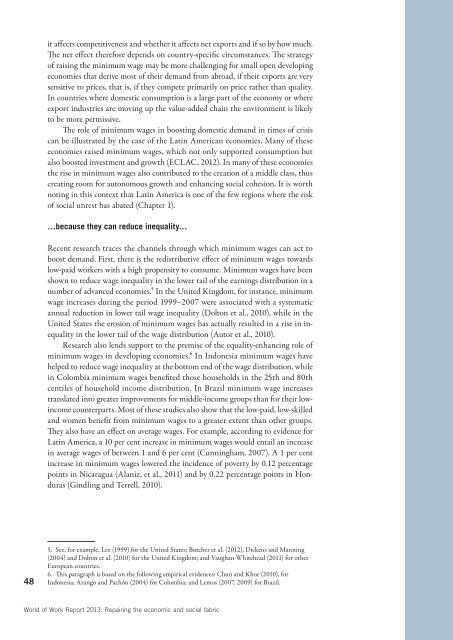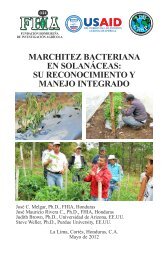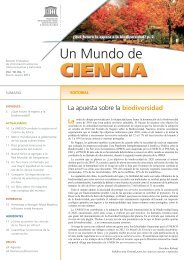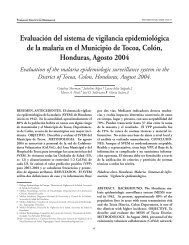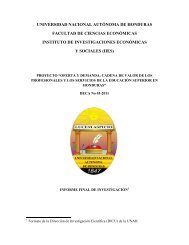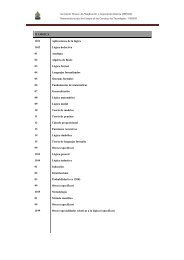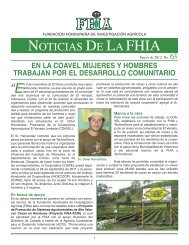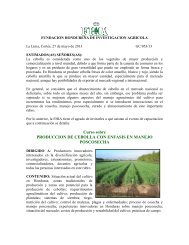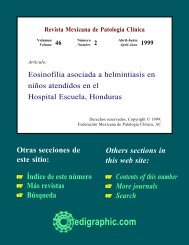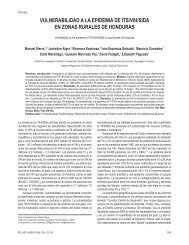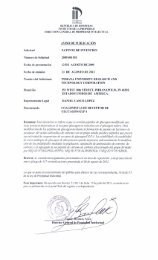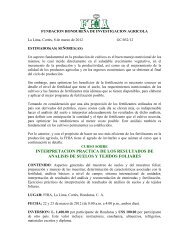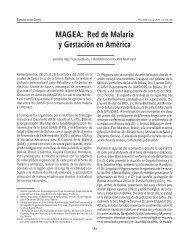World of Work Report 2013 - International Labour Organization
World of Work Report 2013 - International Labour Organization
World of Work Report 2013 - International Labour Organization
You also want an ePaper? Increase the reach of your titles
YUMPU automatically turns print PDFs into web optimized ePapers that Google loves.
it affects competitiveness and whether it affects net exports and if so by how much.<br />
The net effect therefore depends on country-specific circumstances. The strategy<br />
<strong>of</strong> raising the minimum wage may be more challenging for small open developing<br />
economies that derive most <strong>of</strong> their demand from abroad, if their exports are very<br />
sensitive to prices, that is, if they compete primarily on price rather than quality.<br />
In countries where domestic consumption is a large part <strong>of</strong> the economy or where<br />
export industries are moving up the value-added chain the environment is likely<br />
to be more permissive.<br />
The role <strong>of</strong> minimum wages in boosting domestic demand in times <strong>of</strong> crisis<br />
can be illustrated by the case <strong>of</strong> the Latin American economies. Many <strong>of</strong> these<br />
economies raised minimum wages, which not only supported consumption but<br />
also boosted investment and growth (ECLAC, 2012). In many <strong>of</strong> these economies<br />
the rise in minimum wages also contributed to the creation <strong>of</strong> a middle class, thus<br />
creating room for autonomous growth and enhancing social cohesion. It is worth<br />
noting in this context that Latin America is one <strong>of</strong> the few regions where the risk<br />
<strong>of</strong> social unrest has abated (Chapter 1).<br />
…because they can reduce inequality…<br />
Recent research traces the channels through which minimum wages can act to<br />
boost demand. First, there is the redistributive effect <strong>of</strong> minimum wages towards<br />
low-paid workers with a high propensity to consume. Minimum wages have been<br />
shown to reduce wage inequality in the lower tail <strong>of</strong> the earnings distribution in a<br />
number <strong>of</strong> advanced economies.5 In the United Kingdom, for instance, minimum<br />
wage increases during the period 1999–2007 were associated with a systematic<br />
annual reduction in lower tail wage inequality (Dolton et al., 2010), while in the<br />
United States the erosion <strong>of</strong> minimum wages has actually resulted in a rise in inequality<br />
in the lower tail <strong>of</strong> the wage distribution (Autor et al., 2010).<br />
Research also lends support to the premise <strong>of</strong> the equality-enhancing role <strong>of</strong><br />
minimum wages in developing economies.6 In Indonesia minimum wages have<br />
helped to reduce wage inequality at the bottom end <strong>of</strong> the wage distribution, while<br />
in Colombia minimum wages benefited those households in the 25th and 80th<br />
centiles <strong>of</strong> household income distribution. In Brazil minimum wage increases<br />
translated into greater improvements for middle-income groups than for their lowincome<br />
counterparts. Most <strong>of</strong> these studies also show that the low-paid, low-skilled<br />
and women benefit from minimum wages to a greater extent than other groups.<br />
They also have an effect on average wages. For example, according to evidence for<br />
Latin America, a 10 per cent increase in minimum wages would entail an increase<br />
in average wages <strong>of</strong> between 1 and 6 per cent (Cunningham, 2007). A 1 per cent<br />
increase in minimum wages lowered the incidence <strong>of</strong> poverty by 0.12 percentage<br />
points in Nicaragua (Alaniz, et al., 2011) and by 0.22 percentage points in Honduras<br />
(Gindling and Terrell, 2010).<br />
48<br />
5. See, for example, Lee (1999) for the United States; Butcher et al. (2012), Dickens and Manning<br />
(2004) and Dolton et al. (2010) for the United Kingdom; and Vaughan-Whitehead (2011) for other<br />
European countries.<br />
6. This paragraph is based on the following empirical evidences: Chun and Khor (2010), for<br />
Indonesia; Arango and Pachón (2004) for Colombia; and Lemos (2007, 2009) for Brazil.<br />
<strong>World</strong> <strong>of</strong> <strong>Work</strong> <strong>Report</strong> <strong>2013</strong>: Repairing the economic and social fabric


